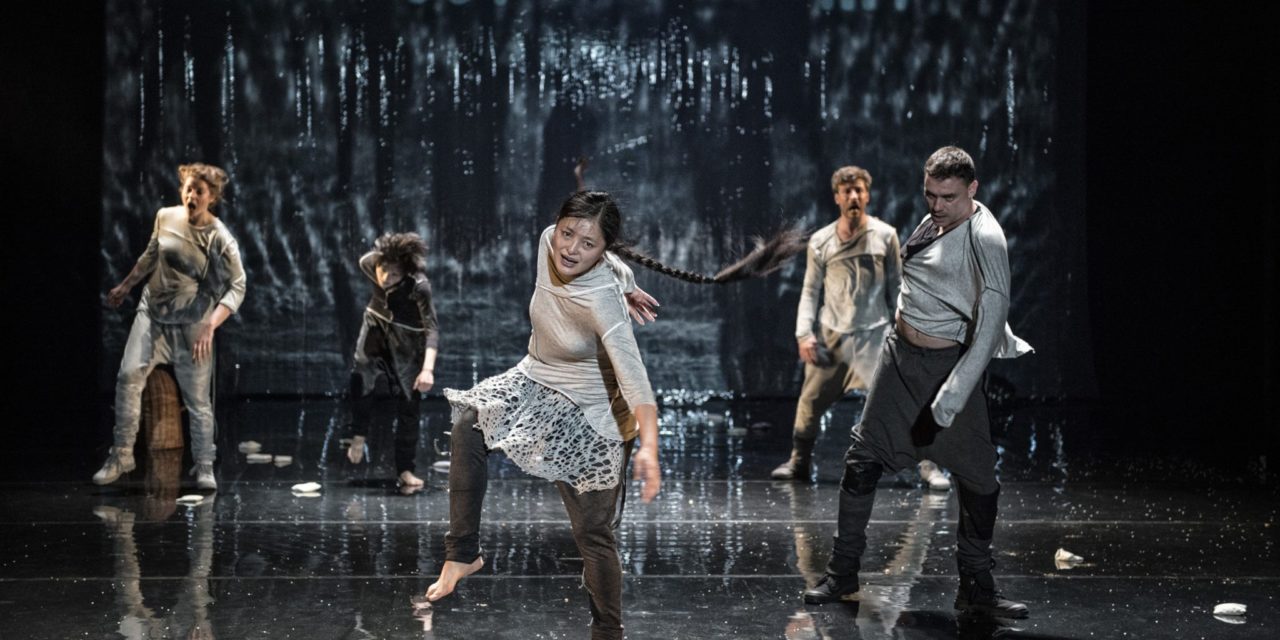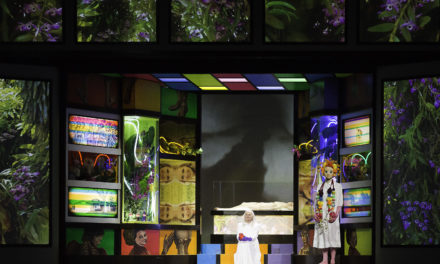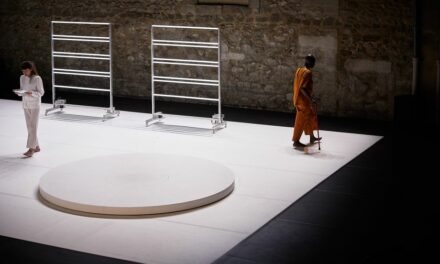In May, September, and November 2016, the Stary Teatr in Krakow staged an exquisite and courageous version of The Decalogue (Dekalog; 十诫). Under the direction of Tian Gebing, founder of the avant-garde theatre group Paper Tiger Studio (纸老虎工作室), based in Beijing, choreographer Wang Yanan, contemporary dance performer Yan Lei, and a Polish cast that includes Małgorzata Gałkowska and Katarzyna Kranowska came up with a fresh, updated, and transcultural vision of such a sensitive sociocultural issue as religion. Essential for understanding the structure of Western epistemology, the religious theme has long lost its vitality in the West, while succumbing to the neoliberal values of the present, but the intervention of a Chinese director allowed its reinvention and adaptation to the psychological needs of modern society.
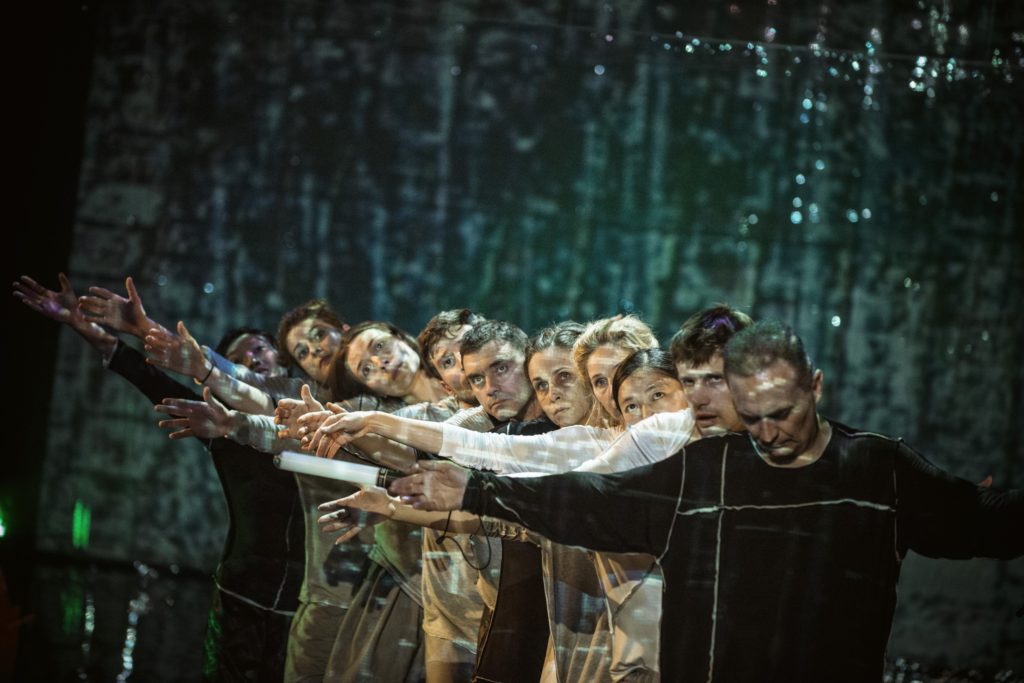
The Decalogue (Dekalog, 2016), directed by Tian Gebing. A Stary Teatr (Krakow) production. Photo credits: Przemysław Krzakiewicz
Theatre director Jan Klata, who serves as artistic director of the Stary Teatr, one of the oldest theatres in Krakow, invited the Chinese team to Poland to discuss the premises of the project, which Tian wanted to be a completely new and relevant look at the question of authority today, from a transcultural perspective. As Polish society is marred by nationalist discourse, the value of Klata’s gesture of initiating a cultural dialogue with China may not only be limited to an attempt at giving once more relevance to a stiffened religious trope. His choice of entrusting the reconceptualization of the Judeo-Christian canon into the hands of a rebellious and non-conventional Chinese director may also be seen as a way of responding to the perilous xenophobic ideologies that are presently shaking Europe. The lucid mind of Tian–untouched by the prejudices that characterise the over-solicitous religious discourse in the West–seemed to be the perfect tool for generating a genuine version of what The Decalogue really represents anywhere in the world right now.
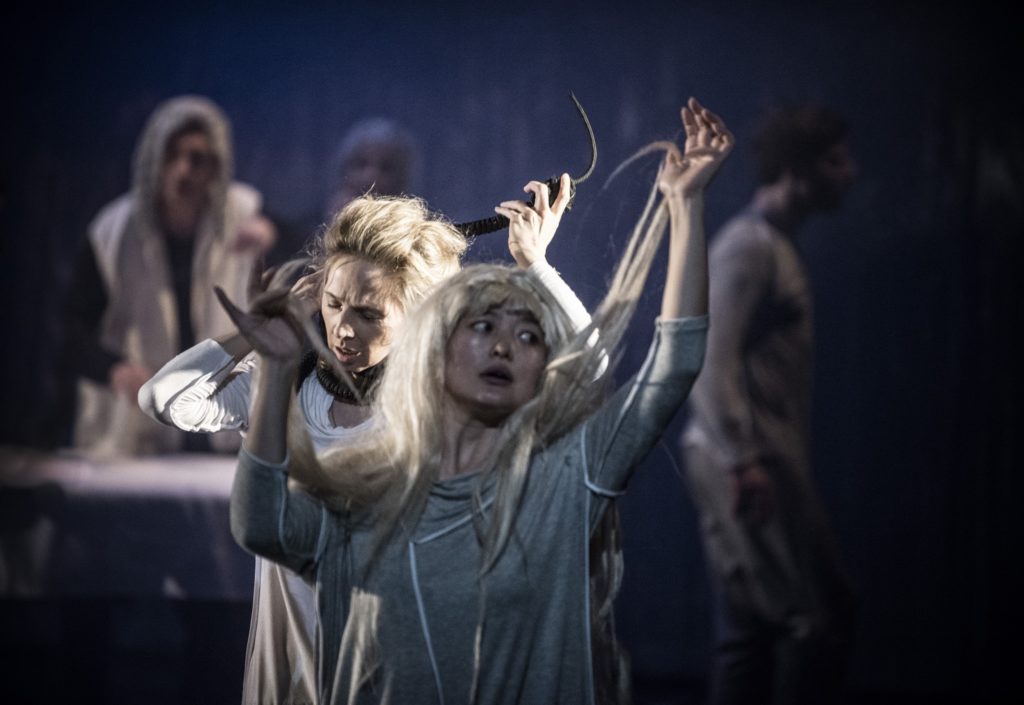
The Decalogue (Dekalog, 2016), directed by Tian Gebing. A Stary Teatr (Krakow) production. Photo credits: Przemysław Krzakiewicz
The Chinese and Polish sides immediately started a fruitful cultural dialogue. For the script, each team contributed five different texts inspired by local social issues in their respective countries. In addition, the Chinese team formulated a set of questionnaires related to the Ten Commandments, which were filled out by various Chinese cultural figures. Their answers, as Tian mentioned in an interview with the author, “resulted into worn-out entanglements of contemporary life” that became the basis for the final version of the script. All texts were then mixed and combined to attest to Tian’s vision of the stage as “the place where the world can be remixed”.[1] The production script thus combines legal texts from court proceedings, pieces of commercial advertisement, news items, homilies, fragments from obstetrics manuals and Mao Zedong’s famous speeches, the sacred archaic language of The Exodus and The Book of David, and citations from Oedipus.
The chaotic intertextuality–a trademark of Paper Tiger Studio’s theatre praxis–relies nevertheless on a hard-core structure, that of questioning the concept of authority transhistorically and transculturally. The audience is faced with the performers’ failed attempt to spell out the ten commandments from the very first act; no commandment is uttered until the end, and what we are left with is the mere echo of forbiddance and interdiction–incapable of relating to a precise content, as if to attest that the whole world, in every single social aspect, is being guided by proscription.
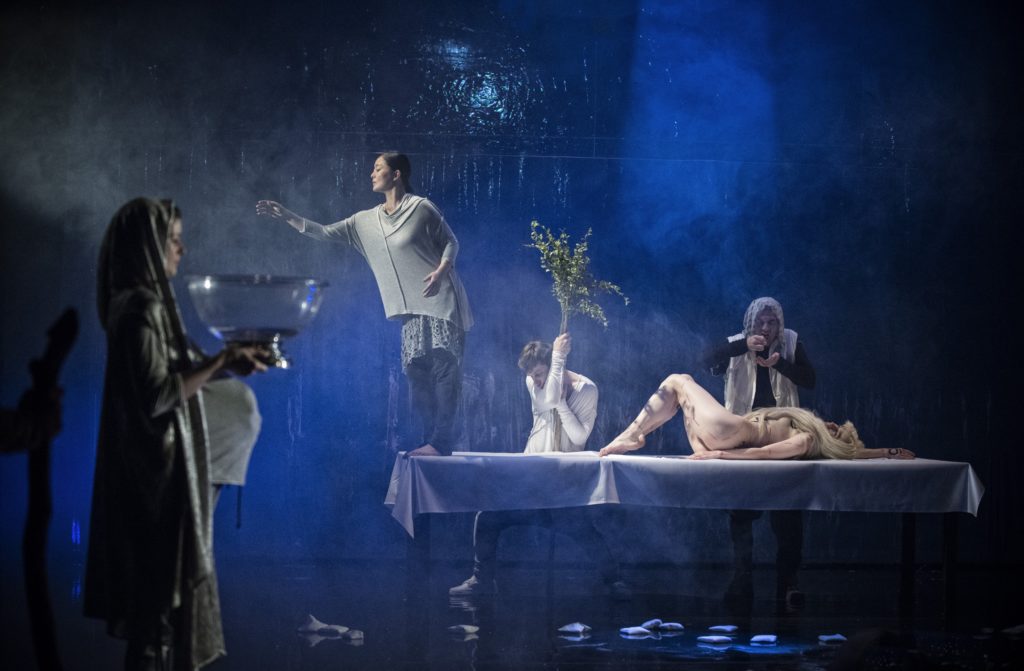
The Decalogue (Dekalog, 2016), directed by Tian Gebing. A Stary Teatr (Krakow) production. Photo credits: Przemysław Krzakiewicz
What follows is a long interplay of multi-register textualities that bring forth biblical characters empowered by God’s mandate on earth, which mingle in an iconoclast manner with contemporary authority figures ranging from Queen Elizabeth II to the Pope and Mao. Each performer represents a distinct commandment connected to a specific social issue featured prominently in the Chinese or Western media. This story or news item is then alluded to through the intertwinement of diverse official register texts or physical symbols. In Tian’s Decalogue, the razor blade–a modern device–stands for the ultimate authoritarian controlling tool that substitutes for God’s presence in the contemporary world. For instance, David’s sin of sending Uriah to war just to have him killed and take possession of his woman is being “washed away” in the script by the miraculous “Rainbow” vacuum cleaner, which in the stage production is represented by a razor. In a gesture of cynical irony, Tian uses the razor as a sin-cleaning tool but also as an instrument of crime and oppression.
The script also recycles a series of stories that made the headlines for a few days in the Chinese media: the tale of a little boy who was abducted, mutilated, and forced into begging is, for Tian, a present-day echo of the childhood story of Moses, whose fate was entrusted to a river. Such transhistorical and transcultural rhizomatic connections attest to the ways in which the Chinese director deals with the question of cultural dialogue in his performance practice. Tian takes bits of Chinese realities from the media, throws them abruptly onto the European stage, and mixes them with the foreign social landscape, allowing the foreign counterpart to represent or misrepresent them, and therefore, in Tian words, to “transform Chinese issues into universal issues”. The purpose of this is not “to point out that China is in a certain way; but rather to exchange linguistic contexts with the other side to generate yet a new performance environment”. Such mix-and-clash technique deconstructs and then reconstructs the many social versions of contemporary China by juxtaposing layers upon layers upon layers of painful Chinese and European realities in transcultural fashion. These fragmentary bits of reality clash and ultimately interconnect within the lost holy structure of The Decalogue to show that both cultural spaces share the same reality: one that is controlled by soulless monitoring structures in which sin and crime are being washed away, cynically, through the miracles of technology.
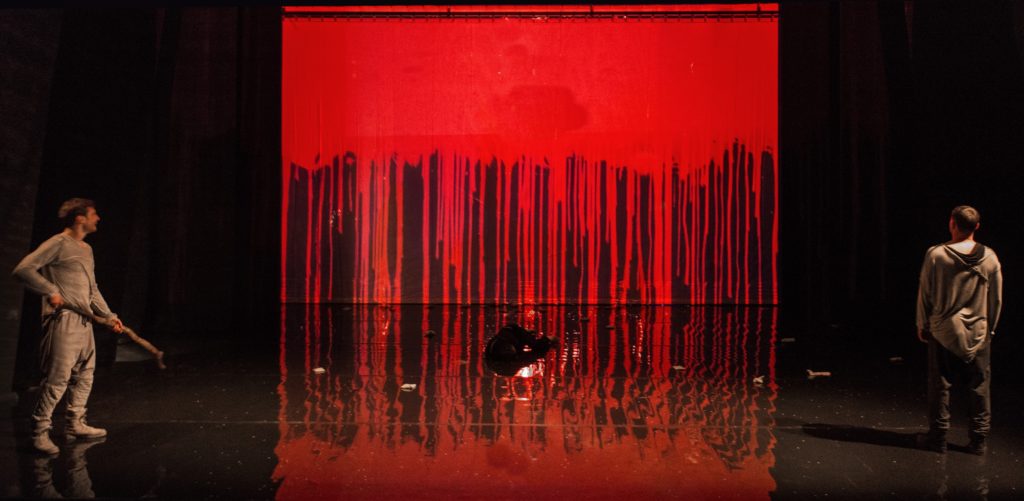
The Decalogue (Dekalog, 2016), directed by Tian Gebing. A Stary Teatr (Krakow) production. Photo credits: Przemysław Krzakiewicz
The transhistorical links that define the question of authority–be it under the modern shape of technology or the orthodoxy of the Old Testament–are visualised on the stage though prominent physicality, wild and yet tamed gestures, and a series of symbolic objects endowed with performative agency. The Polish cast, less used to kinesthetic performance praxis, responded to Tian’s challenge of allowing the body–inscribed with physical and emotional violence–to tell painful stories through mere physicality. In this sense, the final scene that follows the crucifixion of Jesus recycles one of Paper Tiger’s most characteristic practices, previously also observed in Extremely Unclear (极度不清晰), which was staged in China in 2014. The ten performers move repeatedly and synchronically according to a precise pattern as they utter for a good couple of minutes the Chinese sentence: “He killed him” (Ta shasi le ta). The unending and exhausting repetition, resembling the repetition of debilitating everyday life actions, is caught within various structures of power that dominate the contemporary world. But it is also from this very repetition of devitalized everyday actions that lucidity arises, in a koan-like effect: lucidity is supposedly a wise way of embracing the equally exhausted moral forces of contemporary society.
Performer Marta Ścisłowicz admitted that no other previous role required from her such a heightened level of emotional engagement; and it is interesting, but also very Paper Tiger-specific, how performance practices born out of randomness and insignificant everyday gestures can bring to the audience forgotten raw primary emotions that are so much needed in today’s world, whenever we are faced with the ugliness of modernity.
[1] Tian Gebing 田戈兵, “ ‘误读’ 作为一种方法” (Misreading as Method),《艺术界》2 (2010): 104-113.
This post was written by the author in their personal capacity.The opinions expressed in this article are the author’s own and do not reflect the view of The Theatre Times, their staff or collaborators.
This post was written by Andreea Chirita.
The views expressed here belong to the author and do not necessarily reflect our views and opinions.

